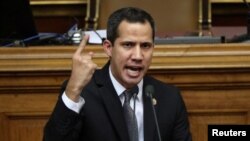Creditors holding Venezuelan debt on Tuesday pushed back on debt restructuring plans backed by opposition leader Juan Guaido, urging a "fair and effective" framework for talks and improved communications with investors holding defaulted bonds.
The main committee of Venezuela creditors said it opposed requests for a U.S. executive order that would prevent asset seizures by investors and disagreed with a proposal to give different treatment for debts to Russia and China.
But the statement added that restructuring would not begin until the end of a "humanitarian crisis," in reference to the hyperinflationary collapse overseen by President Nicolas Maduro that has fueled malnutrition and disease.
"A new government should work with creditor parties, such as the Committee, to agree on the design of the restructuring process and to negotiate the financial and other terms of the restructuring," the statement said.
Guaido in January cited articles of the constitution to assume an interim presidency after calling Maduro's 2018 election a fraud, quickly winning recognition by more than 50 countries including the United States.
Maduro's government, which continues to exercise power thanks to the loyalty of the military, has failed to pay creditors some $11.4 billion in principal and interest since 2017, according to the creditors.
Jose Ignacio Hernandez, Guaido's overseas legal representative, did not immediately respond to a request for comment.
The committee opposed requests by Guaido and his allies for an executive order by the White House that would block creditors from seizing U.S. refiner Citgo, which is owned by state oil company PDVSA.
"An executive order issued by the US government that undermines good faith negotiations would not further the long-term interests of Venezuela or its stakeholders," the statement said.
The committee also took exception to the idea that debts to Russia and China would be treated differently than others.
"It is critical that the burden placed on creditors must be equitably shared among all creditors, public and private," the committee wrote.





